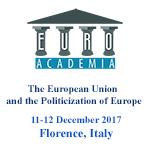Euroacademia Conferences
 Europe Inside-Out: Europe and Europeanness Exposed to Plural Observers (9th Edition) April 24 - 25, 2020
Europe Inside-Out: Europe and Europeanness Exposed to Plural Observers (9th Edition) April 24 - 25, 2020 Identities and Identifications: Politicized Uses of Collective Identities (9th Edition) June 12 - 13, 2020
Identities and Identifications: Politicized Uses of Collective Identities (9th Edition) June 12 - 13, 2020 8th Forum of Critical Studies: Asking Big Questions Again January 24 - 25, 2020
8th Forum of Critical Studies: Asking Big Questions Again January 24 - 25, 2020 Re-Inventing Eastern Europe (7th Edition) December 13 - 14, 2019
Re-Inventing Eastern Europe (7th Edition) December 13 - 14, 2019 The European Union and the Politicization of Europe (8th Edition) October 25 - 26, 2019
The European Union and the Politicization of Europe (8th Edition) October 25 - 26, 2019 Identities and Identifications: Politicized Uses of Collective Identities (8th Edition) June 28 - 29, 2019
Identities and Identifications: Politicized Uses of Collective Identities (8th Edition) June 28 - 29, 2019 The European Union and the Politicization of Europe (7th Edition) January 25 - 26, 2019
The European Union and the Politicization of Europe (7th Edition) January 25 - 26, 2019 7th Forum of Critical Studies: Asking Big Questions Again November 23 - 24, 2018
7th Forum of Critical Studies: Asking Big Questions Again November 23 - 24, 2018 Europe Inside-Out: Europe and Europeanness Exposed to Plural Observers (8th Edition) September 28 - 30, 2018
Europe Inside-Out: Europe and Europeanness Exposed to Plural Observers (8th Edition) September 28 - 30, 2018 Identities and Identifications: Politicized Uses of Collective Identities (7th Edition) June 14 - 15, 2018
Identities and Identifications: Politicized Uses of Collective Identities (7th Edition) June 14 - 15, 2018
Internationalism and the European Cultural Public Sphere :The Heritage of the European Intellectual History of the Late Nineteenth and the Early Twentieth Century
-
-

-
Presentation speakers
- Jukka Kortti, University of Helsinki, Finland
Abstract:
European cooperation has never been not only that between states and non-state organisations, but cultural communication, understanding, and cross-border cultural connections of art, music and literature link countries and peoples through the exchange of ideas. The transnationalisation of public spheres is not a question of postmodern times and the age of social media, but internationalised intellectual milieus have constituted informal networks in modern Europe since the nineteenth century at the latest. Public spheres have never been confined solely to national borders. An important era for this European Enlightenment-founded ‘republic of letters’ was the cultural internationalism of the late nineteenth and early twentieth century. The starting point of my article is the Finnish cultural intelligentsia of the period. These intellectuals, the men of letters of the era were academic, international, well travelled and skilled at languages. These were personalities, who knew the art circles and were interested in different kinds of social, political and cultural topics in Europe. Through empirical analyses, I show how the intelligentsia took part in this transnational public sphere in a European periphery. The situation of Finland in the context of the Russification of the era left its national mark on the international activities of the intelligentsia. Through examples, I demonstrate how this European republic of letters worked, in exchanging ideas and sharing universal ideals in the era before the rise of nationalism in the First World War. I especially depict how nationalism can play a significant role in the activities of intellectuals in small nations. In the periphery, being a cosmopolitan also meant having enough symbolic capital to fight one’s corner in the national sphere. An important way intellectuals could do this was by allying themselves with foreign writers and their work. Since we are currently experiencing the revival of nationalism, this heritage of European intellectual history is worth discussing in the contemporary situation as well.
-
Related Presentations

The Europeanization of Balkans
- George Stavri
- Ljljana Jakovlevic













